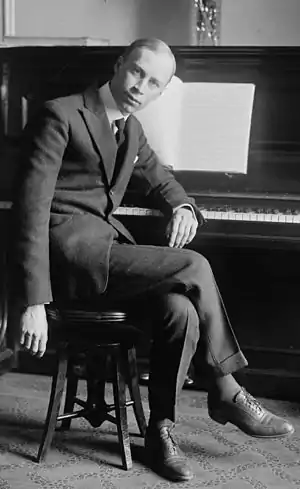Piano Sonata No. 8 (Prokofiev)
Sergei Prokofiev's Piano Sonata No. 8 in B♭ major, Op. 84 (1944) is a sonata for solo piano, the third of the Three War Sonatas. The sonata was first performed on 30 December 1944 in Moscow by Emil Gilels.[1]

Movements
- Andante dolce (in B-flat major)
- Andante sognando (in D-flat major)
- Vivace (in B-flat major)
1. Andante dolce
The movement begins with a melancholy, and mysterious theme that wanders. The key is B♭ major but the sense of tonality is weak due to Prokofiev's frequent modulations to remote keys. After the theme ends, a development, reminiscent of the first movement of the Piano Sonata No.7, follows. Next is a more brooding theme in G minor which goes through a series of modulations as the music prepares for the development section. The development section is unstable and perpetuated by motoric rhythms.
3. Vivace
The movement begins with several arpeggios, introducing one of the main themes, in B♭ major. Tonality is weak, as the very next theme is in A minor. After a brief return to B♭, it then introduces another theme in the key of B major. Then another theme enters, this one in C major. After the initial excited section, the piece enters into a waltz-like portion that is in D♭ major. This waltz-like section is full of dissonances. The piece finally quiets down, entering into a much quieter, more mysterious section, still in D♭. Throughout this section, the left hand includes references to the waltz-like section. Then after this section, the A minor theme returns, building into the return of the opening theme. The final section combines nearly all of the elements that have come before. Tonality is still weak. The C major theme enters transposed to B♭. Then the A minor theme returns, also transposed to B♭. There is a new theme, building up to a grand finale in B♭.
References
- Sorensen, Sugi (2005). "The Prokofiev Page - Piano Sonata No 8 in B♭ m, Op 84". Allegro Media. Archived from the original on 14 April 2012. Retrieved 8 April 2012.
External links
| Wikiquote has quotations related to: Piano Sonata No. 8 (Prokofiev) |
- Prokofiev's Sonata No. 8 on Classical Connect.
- Piano Sonata No. 8, Op. 84: Scores at the International Music Score Library Project
- Prokofiev Piano Sonata No 8 in B♭ major, Opus 84 (1944).